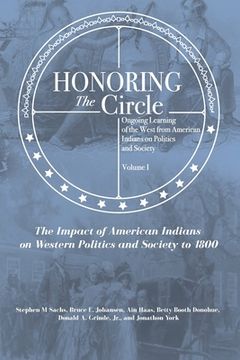Honoring the Circle: Ongoing Learning of the West from American Indians on Politics and Society, Volume I: The Impact of American Indians o (en Inglés)
Reseña del libro "Honoring the Circle: Ongoing Learning of the West from American Indians on Politics and Society, Volume I: The Impact of American Indians o (en Inglés)"
Honoring the Circle: Ongoing Learning from American Indians on Politics and Society, Volume I: The Impact of American Indians on Western Politics and Society to 1800 illuminates the tremendous impact American Indians have had on political, economic and social ideas, institutions and ways since first contact with Europeans. Recognizing that when people of different cultures interact, cultural exchange occurs, Volume I analyzes how traditional inclusive, participatory and mutually supportive American Indian societies functioned well, enabling their strong influence on the West.At contact Indians, wishing good neighbors, worked closely with early European settlers to educate them in Native ways. To varying degrees this Indianized the Europeans, leading to appreciation of democracy and diversity, in an Indianized American culture. Cultural impact is revealed in early American literature. It is distinct from Europe's, by its inclusion of the Indian.Native Americans were well respected in the English colonies, which applied Indian ways of council in town meetings and elected assemblies. By the time of the American Revolution, Indian symbols were in wide use in the colonies. Most European Americans identified as being a mix of the European and the Indian. The Sons of Liberty dressed as Mohawks in the Boston Tea Party out of respect and identification with Native ways.Important leaders such as Roger Williams, Benjamin Franklin, Thomas Jefferson and Thomas Paine interacted regularly with Indians. Moved by Native views of fundamental rights, political participation and federalism, they adopted such principles in American political institutions as in the Declaration of Independence, Articles of Confederation, Constitution and state constitutions. Indian-style respectful discourse was widely adopted, including in procedures of the US Congress, contrasting with the rowdiness of Britain's Parliament.In Europe, from first contact, a flood of reports was received from the Americas with great interest on how Indigenous Americans "had no kings" or property. While among Europeans there was a mix of positive and negative views of Natives of "the New World," reports were overwhelmingly positive about Indians' freedom and good character.These reports had great impact on European thinkers. Beginning with Thomas More's Utopia, in 1519, numerous writers, including Montaigne and Voltaire, used Indian characters and imagined Indian societies to critique European societies and politics.Every major Western political philosophical tradition has been greatly affected by contact with Native Americans. Thomas Hobbes, who had negative views of Indians, began one of the two major shifts in mainstream Western thought resulting from interaction with Indians. Previously, nature had been seen as the end to which something aspired. Beginning with Hobbes, nature became seen as the origin from which things arose, with Indians living in, or near, a "state of nature." The second Indian-influenced shift came with John Locke. For the first time in Europe, he expressed the idea that rights were inalienable. Locke was greatly influenced by Indian ways, though his reaction to those ways sometimes involved agreeing with them, sometimes opposing them, and sometimes inspiring new trains of thought. His Indian-influenced ideas, like those of others in Europe, often reverberated to great effect in America.The ideas of Rousseau, more Indian-influenced than Locke, carried Native influence to the French Revolution and New Deal Liberalism. Socialist and anarchist thinkers' views were greatly affected by Indian influences transmitted through such writers.Honoring the Circle recognizes that Indian-inspired perspectives are one of many organic chains of interacting ideas--absorbed, reformulated and passed on by creative individuals interacting in interweaving cultures.

